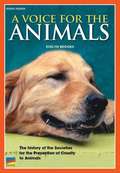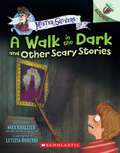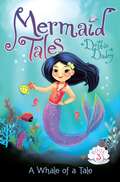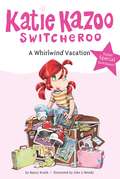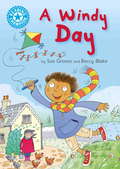- Table View
- List View
A Voice for the Animals
by Nancy White Evelyn BrooksFind out about the importance of kindness while exploring the history of the Society for the Prevention of Cruelty to Animals.
A Voyage Textbook Special English class 11 - MP Board
by Madhya Pradesh Rajya Shiksha Kendra BhopalSpecial English text book for 11 th standard from Madhya pradesh rajya shiksha kendra bhopal in English.
A Voyage Textbook Special English class 12 - MP Board
by madhya pradesh rajya shiksha kendra bhopalA Voyage Textbook Special English text book for 12th standard from Madhya Pradesh Rajya Shiksha Kendra in English.
A Walk in the Dark and Other Scary Stories: An Acorn Book (Mister Shivers)
by Max BrallierJump into these spine-chilling stories from New York Times bestselling author Max Brallier, perfect for beginning readers!Pick a book. Grow a Reader!This series is part of Scholastic's early reader line, Acorn, aimed at children who are learning to read. With easy-to-read text, a short-story format, and full-color artwork on every spread, these books will boost reading confidence and fluency. Acorn books plant a love of reading and help readers grow!Who is at the end of the dark hall? What is a monster doing on the beach? This scary story collection from New York Times bestselling author Max Brallier is perfect for beginning readers who are looking to be spooked. With simple text, creepy full-color artwork on every page, genuine scares, and a spooky “invisible” message on the cover, these five hair-raising stories are sure to send shivers down your spine!
A Walk in the Rain (Fountas & Pinnell Classroom, Guided Reading Grade 1)
by Janie Bynum Marileta RobinsonNIMAC-sourced textbook
A Walk in the Woods (Fountas & Pinnell Classroom, Guided Reading)
by Jacqueline AdamsNIMAC-sourced textbook
A War Between Us (Great Minds Wit & Wisdom #Grade 5, Module 3)
by Great MindsNIMAC-sourced textbook
A War Between Us: Assessment Pack (Great Minds Wit & Wisdom #Grade 5, Module 3)
by Great MindsNIMAC-sourced textbook
A Wave of Change (Fountas & Pinnell Classroom, Guided Reading Grade 5)
by Katy Newquist Renato AlarcãoA DIFFICULT DECISION When a violent tsunami strikes, Kai is faced with a terrible dilemma—and must make a decision he will never forget. NIMAC-sourced textbook
A Whale of a Tale
by Debbie Dadey Tatevik AvakyanIn this sparkling Mermaid Tales adventure, can Kiki overcome her fears and enjoy her first-ever trip to the ocean's surface? The third graders at Trident Academy are traveling to the surface of the ocean for the first time ever for a "hugely" exciting activity: They're going to visit a pod of humpback whales! But Kiki is less than thrilled. In fact, she's scared from the top of her head to the tip of her tail. After all, the enormous creatures could swallow her (and maybe her entire class) in one giant gulp! Kiki's pals Shelly and Echo try to help shrink her fears, and when a new friend comes along--a very big, whale-size friend--Kiki's courage emerges, and the fun looms large.
A Whale of a Tale (Fountas & Pinnell Classroom, Guided Reading Grade 1)
by Gina Shaw Charles LehmannNIMAC-sourced textbook
A Whirlwind Vacation
by Nancy KrulikKatie can't wait to go on a European vacation with her family! She's so excited to see new things and learn how people in other countries live. But she realizes that traveling abroad is harder than she thought, especially when you don't speak another language! And to make matters worse, the magic wind appears four times--turning her into a Buckingham Palace guard, a flamenco dancer in Spain, a gondola driver in Venice, and an artist in Paris! Will Katie be able to handle this vacation chaos?! .
A Whole New You (Fountas & Pinnell Classroom, Guided Reading)
by Nathaniel Clinton Niklas AskerNIMAC-sourced textbook. WHAT'S THE DEAL? "I can help make you young again." That's the offer dying billionaire Malcolm Donaldson receives. But what is the price—and is there a catch?
A Wild Experiment (Fountas & Pinnell Classroom, Guided Reading)
by Mia LewisNIMAC-sourced textbook. ASTONISHING. Decades after wolves disappeared from Yellowstone National Park, scientists decided to try a bold experiment. They released a group of wild wolves into the park and waited anxiously to see what would happen. The results went beyond their wildest expectations.
A Windy Day: Independent Reading Blue 4 (Reading Champion #140)
by Sue GravesIn this story, a very windy day makes it too tricky to do all the farm jobs. Josh thinks it's time to get out the kite!Reading Champion is a series of independent reading books for children to practise and reinforce their developing reading skills.Fantastic, original stories are accompanied by engaging artwork and a reading activity. Each book has been carefully graded so that it can be matched to a child's reading ability, encouraging reading for pleasure.Independent Reading Blue 4 stories are perfect for children aged 4-5 or who are reading at book band 4 (Blue) in classroom reading lessons.

